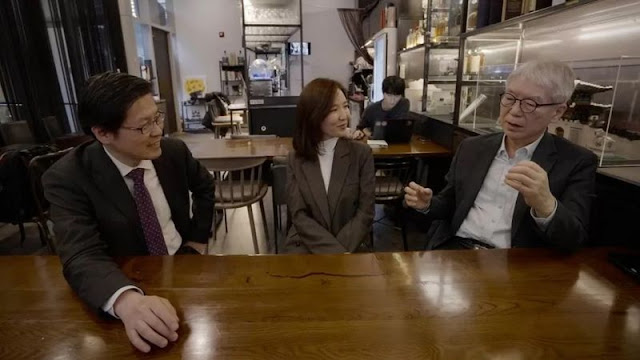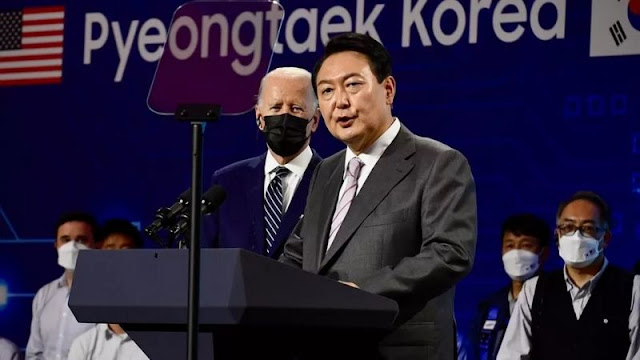In the private area of an underground restaurant in the nation's capital, Seoul, a diverse group of South Koreans assemble for a private lunch. Politicians, scientists, and members of the armed forces are among this category; some of them could be more cautious about disclosing their names.
Actually, it's the Nuclear Policy Forum's first gathering, and their lunchtime program is rather optimistic—it discusses how South Korea can build nuclear weapons.
This concept, which was previously only in the heads of a select few, has rapidly entered the mainstream in recent months. Yoon Suk-Yeol, the president of South Korea, was the only president in recent memory to have brought up the notion during a defense meeting.
Now that regular newspaper columns are supporting the idea, incredible three-quarters of the populace appear to agree with it. South Koreans have spent their entire lives worried about their nuclear-armed northern neighbor.
In the 1970s, South Korea had previously considered the possibility of creating nuclear weapons and had even run a covert program to do so. However, as soon as Washington learned, it warned Seoul that either it should keep up its present nuclear weapons program or risk having its whole nuclear arsenal used to defend it. Tens of thousands of American soldiers have been stationed on the Korean Peninsula ever since he made the decision to seek American assistance.
Since then, there have been significant changes in the geopolitical landscape. People are beginning to wonder if Washington will still stand up for South Korea given that North Korea is developing increasingly powerful nuclear weapons that are capable of hitting cities throughout the United States.
They are imagining a scenario in which Kim Jong-un invades South Korea and the US is compelled to act as a peacemaker. Then, if America does not end the war, Kim threatens to detonate a nuclear bomb on American soil. What would Washington do in this circumstance? Can he preserve Seoul at the cost of razing San Francisco? possibly not And those who were present in the underground chamber during this covert meal came to this conclusion.
It is absurd to believe that another nation will come and protect us, said Choi Ji-young, a forum participant and a member of the People's Power Party, which is now in power in South Korea. This is both our issue and obligation.
Educationist and forum chairman Cheung Seung-Chang presented his suggested strategy. Seoul has now announced that it will leave the Nuclear Non-Proliferation Treaty (NPT) if North Korea conducts a nuclear test again. Seoul would start constructing its own nuclear arsenal if Kim refuses to agree to give up its nukes within six months. According to Cheung, this would lessen the likelihood of a nuclear conflict on the Korean Peninsula since Kim would be deterred from attacking if he thought South Korea could retaliate.
Jenny Town of the US-based think tank 38 North questions this supposition, arguing that it is doubtful that a South Korea with nuclear weapons will make the North less daring. "More nuclear weapons cannot make the world nuclear-free," he declared. "That's not what we've seen, for instance, in India and Pakistan." Being equipped with nuclear weapons allows both parties to move a bit further if anything (bad) occurs.
Furthermore, Washington has no desire for a nuclear-armed South Korea. But even so, America contributed to the birth of this monster. Former President Donald Trump charged South Korea with free-riding in 2016. They vowed to either make Seoul pay for the US soldiers stationed on its territory or to have their forces withdrawn. People's terror was not lessened over time by these words. An increasing proportion of South Koreans are now in favor of developing a nuclear weapon after realizing that America's pledges are only as good as its next president.
On a recent Sunday afternoon, young and old from various backgrounds gathered at a local sauna (a type of steam bath) in Seoul for their weekly pain-relief program, sipping beer and fries. Also enjoying the chicken. Although it may seem odd to discuss nuclear proliferation in such an environment, it was discussed there and is seen in almost every gathering these days.
The US won't safeguard us with its nuclear weapons, so we must defend ourselves, according to Ko Song-Wook, 31. served South Korea during a North Korean island attack that left four people dead.
It appeared to be a complete emergency, he recalled. People were making wills while units were calling their parents. They are now concerned about China as well as North Korea.
We have to tread carefully around these big powers because they are all around us, he warned. In order to combat them, we need nuclear weapons.
Almost everyone in Savannah was in agreement; Hong In-soo, 82, even nodded in agreement. She has always held anti-nuclear beliefs despite having been a little child throughout the Korean War in the 1950s, although she grudgingly concedes that nuclear weapons are a necessary evil now: "Other nations are prospering, so I fail to see how we can continue without them." Our planet is evolving.
Another woman was unsure whether the US would defend South Korea and believed that having nuclear weapons was still preferable. Seoul's current relationship with the US might therefore shift at any time.
In an effort to convince its ally of its "ironclad" commitment to their safety, Washington is currently doing so. It berthed a sizable nuclear-powered aircraft carrier earlier this month in the southern port of Busan. But to the surprise of American politicians, these reassuring steps appear to be ineffective.
Because they don't know when the US president will be prepared to detonate the nuclear device on their behalf, Seoul's politicians are sick of being in the dark. Right now, Yoon isn't even required to be informed before Joe Biden acts. At the absolute least, Meztown added, "We can consider making a mandatory phone call, but even then, that would be up to the president of the United States."
President Yoon was in the same room as Yang Yook, a defense analyst at the Asan Institute in Seoul when President Yoon expressed his opinion on South Korea's nuclear weapons program. They assert that Yun was exerting pressure on the US covertly. He claimed that despite the United States' strong reluctance to discuss its nuclear strategy with South Korea, we would suffer the most losses if a nuclear conflict broke out on the peninsula.
Seoul is seeking increased participation in nuclear planning and execution. This may entail maintaining US nuclear weapons in South Korea or establishing a nuclear sharing agreement such as that in Europe wherein South Korea could employ US weapons in the case of war. The establishment of a joint nuclear planning body with the US would be a less draconian solution.
The U.S. is not likely to provide much, but he is aware that he must present some sort of tangible plan that President Yoon-jit can tout as a success and convince the people of South Korea to support. However, it appears to be too little, too late. It was once an unthinkable concept, but now it is so deeply ingrained in South Korean culture that it is unclear how it can be removed.
The choice to possess nuclear weapons is a major one. The foundation of the current international order is the non-proliferation of nuclear weapons, and those that pose a threat to that order, such as Iran and North Korea, have paid a high price.
Only one woman in Savannah acknowledged that it might not be worthwhile if pursuing nuclear power meant South Korea joined the "axis of evil."
This, however, is not likely to occur. South Korea cannot be ignored like North Korea because of its strategic and economic importance. According to the majority of observers, the US is unlikely to sever its long-standing military partnership. Instead, the worry is that a potential nuclear weapon from South Korea would lead to a rift in the non-proliferation framework, which would encourage other nations to follow suit.
Only Hong In-soo, 82 old years, can see the dangers that lie ahead. He offered a proverb from Korean that merely means "falling into your own excrement," meaning that it can have serious repercussions.
I believe that nuclear weapons will eventually harm us, he said. I'm sorry for the next generation.











0 Comments